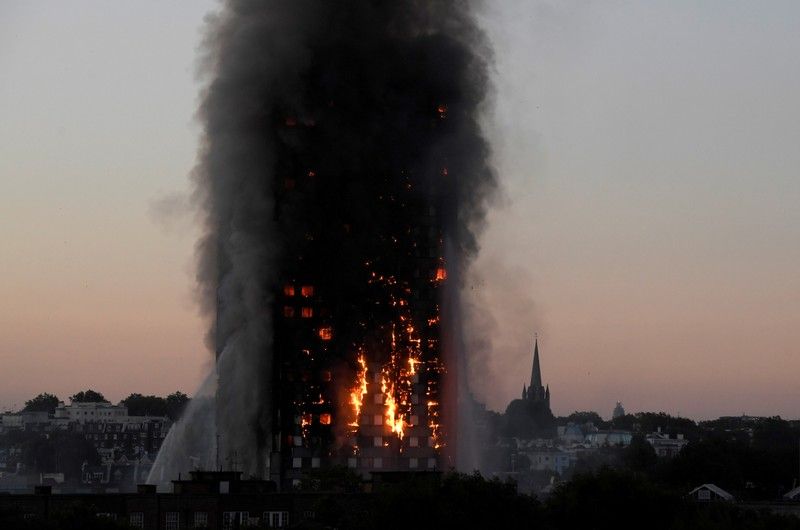LONDON, (Reuters) – Grave failings by the London Fire Brigade during the Grenfell Tower blaze, which killed 71 people in 2017, meant that some lives that could have been saved were lost, a public inquiry has found.
The fire, Britain’s deadliest in a residential building since World War Two, shocked the nation and prompted soul-searching about how the densely populated social housing block in west London had been allowed to become a death trap.
In its first phase, the public inquiry led by retired judge Martin Moore-Bick examined in forensic detail the sequence of events at the 23-storey tower on the night of June 14, 2017, including the fire brigade’s actions.
Other issues, such as what went wrong in the design and maintenance of the tower, whether safety regulations were adhered to and whether they were adequate, will be addressed during phase two.
 According to excerpts of his phase one report, widely published by British media on Tuesday ahead of the official publication on Wednesday, Moore-Bick said that an electrical fault in a refrigerator in a fourth-floor flat had started the fire.
According to excerpts of his phase one report, widely published by British media on Tuesday ahead of the official publication on Wednesday, Moore-Bick said that an electrical fault in a refrigerator in a fourth-floor flat had started the fire.
Flames then rapidly engulfed the tower, mainly because it had been covered during a recent refurbishment with cladding made out of flammable aluminium composite material which acted as a source of fuel.
Moore-Bick praised the “extraordinary courage” of firefighters at the scene, some of whom climbed high into the burning building to help residents escape.
“GRAVELY INADEQUATE”
But he decried a number of institutional failings among fire brigade chiefs, saying preparations and training for an event such as the Grenfell fire were gravely inadequate and that serious mistakes were made on the night.
In particular, he said commanders had stuck for far too long with the “stay put” strategy, which meant residents calling the 999 emergency number as the tower burned were advised to remain in their apartments and await rescue.
He said there would have been fewer fatalities if the decision to tell residents to evacuate had been made an hour or more earlier than it was.
“The ‘stay put’ concept had become an article of faith within the LFB (London Fire Brigade) so powerful that to depart from it was to all intents and purposes unthinkable,” he wrote.
In theory, high-rise buildings are designed to ensure that fire cannot spread from one unit to another. That means it is usually safer for residents to stay in their homes while firefighters tackle a fire, as opposed to running out into dangerous fumes and getting in the way.
But at Grenfell Tower the fire spread so rapidly that firefighters were never able to bring it under control. It raged through the night until the building was a charred ruin and everyone inside was dead.
Moore-Bick said evidence given to the inquiry by the head of the fire brigade, Dany Cotton, was “remarkably insensitive”.
“The commissioner’s evidence that she would not change anything about the response of the LFB on the night, even with the benefit of hindsight, only serves to demonstrate that the LFB is an institution at risk of not learning the lessons of the Grenfell Tower fire,” he wrote.
Cotton, who has previously announced plans to retire, made no public comment.
A spokeswoman for the London Fire Brigade said it would be inappropriate to comment on the phase one report before its official publication on Wednesday.
“SCAPEGOAT”
Matt Wrack, head of the Fire Brigades Union which represents rank-and-file firefighters, said Cotton should not be made a scapegoat when the Grenfell fire was a result of multiple long-term failings by successive governments.
“My frustration with this is that individual firefighters including senior officers like Dany Cotton are being subject to a degree of scrutiny which government ministers are avoiding,” he told BBC Radio 4.
Wrack said the public inquiry was “back to front” and should have first looked into the deeper causes of the tragedy. He said the building itself had “completely failed” and the fire service’s actions should be judged within that context.
“Nobody has ever evacuated a residential building in those circumstances in Britain,” he said. “Nobody’s explained how you would alert residents when there’s no common fire alarm system.”
A police investigation into the Grenfell Tower disaster is ongoing, but no decision will be made on whether anyone will face criminal charges until the conclusion of the public inquiry process, which could be in 2022.
